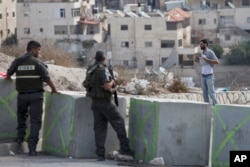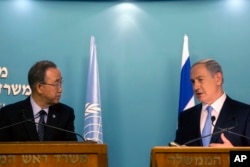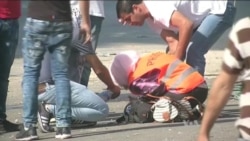U.S. Secretary of State John Kerry is traveling to Europe and the Middle East in a bid to help ease escalating violence between Israel and the Palestinians that has left more than 50 people dead.
The State Department said Kerry would begin his trip Wednesday and also would consult with U.S. partners and allies on security issues, the threats posed by Islamic State militants, and continuing unrest in Syria and Ukraine. He is expected to meet with his counterparts from Saudi Arabia, Turkey, Russia and Jordan.
A focal point of the trip will be talks with Israeli Prime Minister Benjamin Netanyahu and Palestinian leader Mahmoud Abbas.
In recent weeks, tensions have increased between Israelis and Palestinians, partly as a result of what Palestinians see as a Jewish encroachment on the al-Aqsa Mosque compound in Jerusalem, one of the most sacred sites in Islam. The site also is known as the Temple Mount.
The violence has included a string of knife attacks by Palestinians and fatal shootings by Israeli security forces.
“I think we have to be very aware of the sensitivities that have built up everywhere, and so we have to move carefully,” Kerry said Tuesday during a State Department forum. He said the talks with the Israeli and Palestinian leaders would provide an opportunity to “pull people back from a precipice.”
Later, in a Tuesday briefing, State Department spokesman John Kirby said the U.S. was continuing to urge both sides to return to talks on reaching a two-state solution. Those talks broke off more than a year ago.
Tough comments
Both Israel and the Palestinians appear to be digging in on their positions.
“I believe it is time to tell the truth about Palestinian terrorism,” Netanyahu said Tuesday. “It is not the settlements. It is not the peace process. It is the desire to destroy the state of Israel, pure and simple.”
The prime minister commented during a joint appearance with U.N. Secretary-General Ban Ki-moon, who is on a two-day visit to the region to try to help quell the unrest.
Abbas pointed a finger of blame at Israel on Tuesday during talks with Lithuanian President Dalia Grybauskaite.
“I briefed her and her delegation on the situation in Palestine and the difficult and the unbearable circumstances our people are living under because of the continuous Israeli occupation of our homeland,” he said.
Go-slow approach
Analysts say that while it is important for the U.S. to be seen as engaging in efforts to defuse the conflict, there are limits to what the U.S. can do at this point.
“We have to understand when there is this degree of violence on the ground, diplomacy may have to take a back seat,” said Ghaith al-Omari, a Middle East analyst at the Washington Institute.
He said a broader focus on “what’s next” by Kerry could be more effective.
“Once the violence abates — and hopefully it will abate — what’s the next step? What can be done to ensure that a similar flare-up of violence does not occur six months from now or a year from now?” he said.
WATCH: Related video from VOA's Pamela Dockins:
However, an underlying cause of the violence is a Palestinian “loss of faith,” said researcher Mahmoud Jaraba of the Erlangen Center for Islam and Law in Europe and professor Lihi Ben Shitrit of the University of Georgia in Athens.
In an October article published by the Carnegie Endowment for International Peace, they said Palestinians are experiencing a “growing and profound sense of suffocation and loss of hope.”
The authors said many Palestinians believe the prospects of a peace process that leads to tangible results for them have vanished.








